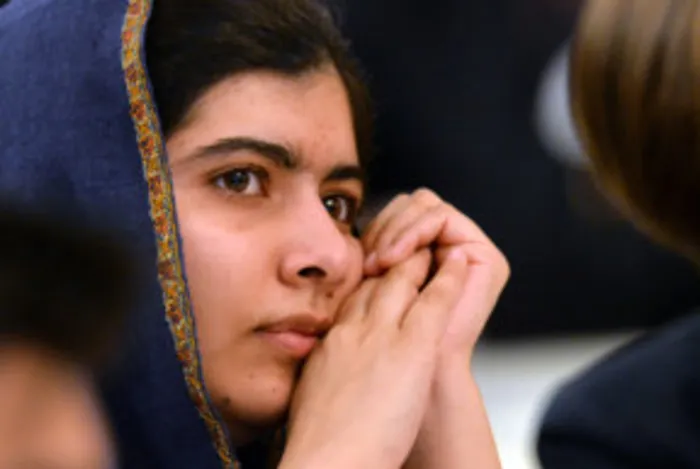The world must recognise Afghanistan’s ‘gender apartheid’, Malala says during Nelson Mandela memorial lecture

Nobel Prize Laureate Malala Yousafzai led the 2023 Nelson Mandela lecture calling on the world to recognise and criminalise the gender apartheid plaguing Afghanistan under the Taliban rule. Picture: AFP / PAUL ELLIS
Nobel Prize Laureate Malala Yousafzai called on world leaders to recognise and criminalise the “gender apartheid” under the Taliban in Afghanistan, which is effectively imprisoning women on a mass scale.
“I would like to bring attention to the girls of Afghanistan, whose suffering has been sidelined. Our first imperative is to call the regime in Afghanistan what it really is. It is a gender apartheid,” Yousafzai said.
“We know that gender based discrimination exists in every country, gender based persecution exists in many countries but gender apartheid is different. Apartheid is a system that is imposed and enforced by those in power,” she said.
The Pakistani activist was speaking during the Nelson Mandela lecture in Johannesburg as the world marked the 10th anniversary of Madiba’s death.
Before getting into the meat of her lecture, which centred around the crimes against women in Afghanistan, Yousafzai paid homage to the former first lady and Mandela’s wife, Graça Machel, who was part of the panel discussion afterwards.
“The very people who are supposed to protect their citizens in South Africa, defended such a system that it was somehow the natural order of things to segregate whites from non-whites,” Yousafzai said.
“Similarly, in Afghanistan the Taliban say that oppression of girls and women is a matter of religion. So let me say this as plainly as possible, that is only an excuse.”
Around August 2021, the Taliban regained power in Afghanistan as the United States withdrew its forces from the foreign region, according to Al Jazeera.
Since winning back rule of the region, the Taliban imposed severe restrictions for women and girls in their country, excluding women from senior government posts and suspending school for teenage girls in many of the 34 provinces.
According to a United Nations report looking into the effect of the Taliban's control on women, it found that the women and girls in Afghanistan are excluded from everyday aspects of life.
The Taliban also control how women and girls dress.
The issue of gender based violence in South Africa has also been a sore point for many years, with increases recorded in the number of crimes committed against women, according to South African Police Service Statistics.
From July to September 2023, 881 South African women were murdered and over 14,000 assaulted, according to crime stats for the second quarter of the year.
Over 10,000 South African women were raped during this same period.
Machel said that it was not just the people of South Africa or Afghanistan to stand up against the crimes against women but women from around the world.
Machel said action needed to be taken before the system implemented by the Taliban strengthens and becomes increasingly difficult to defeat.
“We can argue about the international laws et cetera, but the more that system consolidates itself., the more difficult it would be to eradicate it,” Machel said.
“Experience tells us the more you go the legal way only you will be entertained. But the most powerful thing is social mobilisation.”
IOL